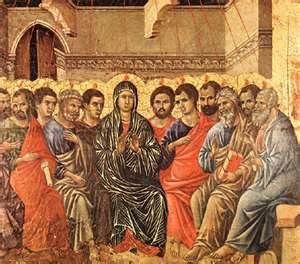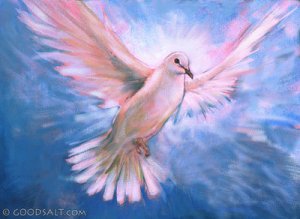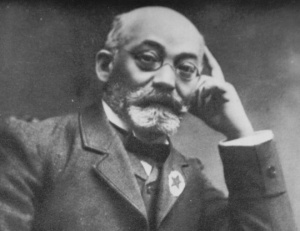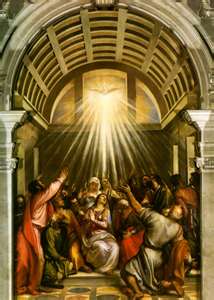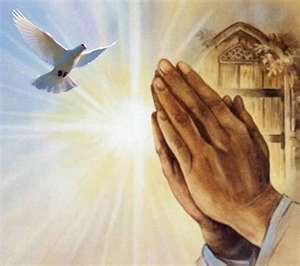On Resurrection Day, Jesus breathed on His disciples, a gesture odd in itself but packed with meaning for our celebration of Pentecost today.
Gospel (Read Jn 20:19-23)
Today’s [May 19] Gospel tells us that Jesus surprised the disciples “on the evening of that first day of the week” by appearing in their midst without using a door (locked “for fear of the Jews”). We wonder if He had to calm them down a bit, because He said, twice, “Peace be with you.” We can imagine how startled they were. He showed them His wounds, in case they thought He was a ghost. Then, Jesus gave the apostles an astonishing commission: “As the Father has sent Me, so I send you.” What had begun three years earlier with a call to “Follow Me” (Mt 4:19) culminated in a sending out. Their work was to be a continuation of the divine apostleship of Jesus (“apostle” means “one sent”; see Heb. 3:1). If we have paid attention to the Gospel accounts of Jesus’ companionship with these men, we have seen clear indications that He intended to give the apostles authority to build His Church and do His work. We are impressed by the scope of their mission but not really surprised by it. However, after announcing His directive to them, Jesus steps out of the expected with an action that can only be described as strange: “He breathed on them and said, ‘Receive the Holy Spirit.’” Don’t let familiarity with this verse rob it of its shock value. Why on earth did Jesus breathe on His apostles?
To understand this moment, so different from anything we’ve yet seen in any Gospel account, we have to go back to the beginning, to the first time divinity breathed on humanity. At Creation, “the LORD God formed man of dust from the ground, and breathed into his nostrils the breath of life, and man became a living being” (Gen 2:7). There is no clearer image than this of God’s desire to impart His own life into man, who is made in His image and likeness. Adam and Eve’s fall into sin robbed them (and us) of their inheritance as God’s children, but the entire story of salvation reveals God’s plan to restore and renew His life in us. So vivid is this image of God’s breath in man that it appears again at the time of the prophet, Ezekiel. God’s people, Israel, were in exile in Babylon; they had been ravaged by their enemies as punishment for their covenant unfaithfulness. They represent all of us who are spiritually dead and entirely helpless. However, in His unrelenting determination to restore His people, God says to Ezekiel (whom He called “son of man”): “’Son of man, can these bones live?’ And I answered, ‘O LORD God, Thou knowest.’ Again He said, ‘Prophesy to these bones, and say to them, O dry bones, hear the word of the LORD…Behold, I will cause breath to enter you, and you shall live…and you shall know that I am the LORD’” (Ez 36:3-6).
When we know this Old Testament history, Jesus breathing on the apostles on Resurrection Day no longer seems so odd, does it? In this gesture, He begins the divinization of man, always God’s intention for His children. The renewal of humanity begins, once again, with the breath of God. For the apostles, this unique action enabled them to truly be Jesus’ continuing presence on earth. They will forgive or retain sins, an action reserved for Divinity. What about the rest of us? Will the breath of God blow on us, too? The other readings will help answer this question.
Possible response: Father, thank You for loving us enough to share Your own breath with us—a marvel beyond description.

First Reading (Read Acts 2:1-11)
At His Ascension, Jesus told the apostles not to start on their mission of making disciples of all nations until they received “power when the Holy Spirit has come upon you” (Acts 1:8). This helps us see that Jesus’ action of breathing on them on Resurrection Day was an initiation into the Holy Spirit, not the fullness they were meant to have. For that, Jesus had them wait for the Jewish feast of Pentecost, nine days later. Pentecost originally had been a harvest festival in the Jewish liturgical calendar; gradually it also became associated with a memorial celebration of God’s giving of the Law to His people at Mt. Sinai, when they had been delivered from slavery in Egypt. The Law, or Torah, gave the people a way of life that would distinguish them from all other peoples on earth. To seal the covenant, God actually came down on top of Mt. Sinai, manifested in fire, smoke, thunder, an earthquake, and the loud sound of a trumpet (see Ex 19:16-19). It was quite the fireworks show!
We need to know this history, because it helps us understand why Jesus waited until Pentecost to send the Holy Spirit on His Church. Drawing on all the parallels with God’s visit to Mt. Sinai, the Jews gathered there in Jerusalem that day could comprehend this action as the “harvest” of God’s people, ready now, because of Jesus’ accomplished work, to receive God’s new Law of Love, to be written not on stone tablets but in the hearts of men by the Holy Spirit. Just as God’s descent on Sinai meant the formation of Israel as a nation, the descent of the Holy Spirit on Pentecost meant the formation of Jews and Gentiles into the Church, the new Israel.
Of course, the events on Pentecost evoke the deep symbolism of wind and fire throughout the Old Testament, not just at the Mt. Sinai covenant. At Creation, “the wind” of God (literally, God’s “breath”) hovered over the waters of the earth, ready to do God’s bidding as He brought forth life (Gen 1:2). The “wind” of God also blew apart the waters of the Red Sea so God’s people could escape from their enemies, the Egyptians. As for fire, recall that God first appeared to Moses, the deliverer of His people, in a fiery bush. Also, the people had to follow a pillar of fire to make their way home to the Promised Land.
The more we know of the imagery representing God in the Old Testament, the more we understand the Descent of the Holy Spirit on Pentecost as an explosion of fulfilled promises! See that the tongues of fire rested over each of the apostles. They will now be God’s presence in His Church, leading His people on their journey home to heaven. To this day, the bishops of the Church, who are successors of these apostles, wear hats (mitres) in the shape of a flame of fire. They are marked out as our pillars of fire, leading us on our pilgrim journey home to heaven.
What about the effects of all this amazing action? The apostles were miraculously able to communicate the Gospel in the foreign tongues of the Jews assembled there. All male Jews were required to make a yearly pilgrimage to Jerusalem for this feast; that explains why “there were devout Jews from every nation” there. This immediately evokes the history of Babel (see Gen 11:1-9). There human pride made a grab at heaven by building a tower up to God. The solidarity of men (made possible by one language) was perverted to accomplish an evil end. God broke it by confusing the one language into many. Now, in the fullness of time, God grants the human solidarity for which man longs (because he is made for that) but which he cannot naturally achieve. The Holy Spirit creates supernatural solidarity, represented here by all men being able to hear, in their own language, the mighty works of God. This time, God reaches down to man rather than man trying to climb up to God.
So, now that we understand something of the background of Pentecost, we can ask whether all the rest of us who aren’t apostles will also have a share in this breath of God. The answer is YES. In verses not included in today’s reading, Peter answers the “what about us?” question: “Repent and be baptized every one of you in the name of Jesus Christ for the forgiveness of your sins; and you shall receive the gift of the Holy Spirit” (Acts 2:28). Jesus wants to breathe on all of us and thus renew the face of the earth.
Possible response: Lord Jesus, may Your Church always live in the joy of Pentecost, in awe of Your power and presence.
Psalm (Read Ps 104:1, 24, 29-30, 31, 34)
Today’s psalm celebrates the life-giving power of God’s Spirit. Written long before the Day of Pentecost, it nevertheless summarizes both the past and the future. “If you take away their breath, they perish and return to their dust” (Ps 104:29) reminds us of the Fall, at the beginning of man’s story. Disobedience led to death: “You are dust, and to dust you shall return” (Gen 3:19b). “When You send forth Your Spirit, they are created, and You renew the face of the earth” (Ps 104:30) describes our celebration today. The world, weary in sin, is in dire need of refreshment and renewal. Maybe we are, too. The psalm response is the perfect Pentecost prayer: “Lord, send out Your Spirit, and renew the face of the earth.”
Possible response: The psalm is, itself, a response to our other readings. Read it again prayerfully to make it your own.
Second Reading (Read 1 Cor 12:3b-7, 12-13)
The Gospel showed us God’s desire to once again breathe His life into man. The Book of Acts showed us that the gift of God’s breath, the Holy Spirit, entered the stream of human history on the Day of Pentecost, producing miraculous results. In the epistle, St. Paul gives us a theological reflection on themeaning of all this history. He explains that none of us can confess Jesus as Lord without the Holy Spirit. Our Christian faith is, itself, a work of God’s breath, the Spirit, in us. That Spirit gives to believers a wide variety of spiritual gifts, creating diversity of service in His Church. However, because it is “the same God” Who produces this diversity, we are “one body.” St. Paul’s emphasis here is on the unity created by the Holy Spirit. Let’s consider this for a moment.
Unity is the distinguishing characteristic of the Trinity—three Persons in One. Man, created in the image and likeness of God, is hard-wired for unity, for communion with both God and others. Sin shattered this unity (recall the immediate fracture of Adam and Eve’s relationship with God and each other in the Garden). Babel showed us that when men actually cobble together unity, their pride bends them towards a perverse use of it. God’s descent on Mt. Sinai was for the purpose of forming one nation for Himself out of many tribes. He gave them one way to worship and one law to live by. In time, that nation fractured, and a large part of it completely disappeared. Men cannot create unity for themselves, although their hearts long for it. Fittingly, unity in His Church was the one thing for which Jesus prayed as He faced His Passion: “I…pray…that they may all be one…so that the world may believe that You have sent Me” (Jn 17:20-21).
On Pentecost, God sent His breath to create supernatural unity. It was experienced immediately among the first converts, and it is a constant manifestation of God’s breath in His Church, 2000 years later. The life of Jesus in us, the Holy Spirit, holds us in His one Body. Unity at last—alleluia!
Possible response: Lord Jesus, forgive me when I rebel against unity—wanting my own way, isolating myself. Let Your Spirit lead me to the unity for which my heart longs.
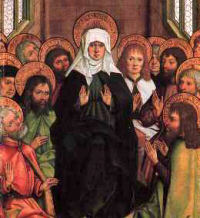
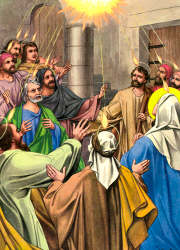 Ten days had passed, it was Sunday, the seventh Sunday after the resurrection. At about nine o'clock in the morning, as they were together praying fervently, the Holy Spirit descended upon them. Note how all the great theophanies in Christ's life occurred during the course of prayer. After His baptism, for instance, when Jesus was praying the heavens opened and the Holy Spirit descended in the form of a dove; likewise, it was during prayer at night that the transfiguration took place on Tabor. Surely too it was while Mary was praying that Gabriel delivered his message, and the Holy Spirit overshadowed her. Pentecost followed precedent. The small community of Christians had prepared themselves through prayer for the coming of the Paraclete. The same is true at Mass today, every day; through prayer we ready our souls for the advent of the Spirit.
Ten days had passed, it was Sunday, the seventh Sunday after the resurrection. At about nine o'clock in the morning, as they were together praying fervently, the Holy Spirit descended upon them. Note how all the great theophanies in Christ's life occurred during the course of prayer. After His baptism, for instance, when Jesus was praying the heavens opened and the Holy Spirit descended in the form of a dove; likewise, it was during prayer at night that the transfiguration took place on Tabor. Surely too it was while Mary was praying that Gabriel delivered his message, and the Holy Spirit overshadowed her. Pentecost followed precedent. The small community of Christians had prepared themselves through prayer for the coming of the Paraclete. The same is true at Mass today, every day; through prayer we ready our souls for the advent of the Spirit. 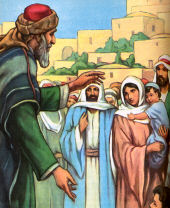 But the malicious too were present; they had the answer. Nothing marvelous at all! Those Galileans were simply drunk, and their drunken babble sounded like a foreign language! Peter showed no hesitation in answering the charge. None of their number, he said, were intoxicated; it was but nine o'clock in the morning, and at that hour men usually are sober. What the multitude saw was, in fact, the fulfillment of Joel's prophecy: In those days (of the Messiah), God will pour forth His Spirit upon men and they will prophesy. . . . Then the apostle pointed his words more directly against the accusers: they had killed Jesus, had nailed Him to the Cross; but God had awakened Him and after His departure to heaven, He sent the Holy Spirit.
But the malicious too were present; they had the answer. Nothing marvelous at all! Those Galileans were simply drunk, and their drunken babble sounded like a foreign language! Peter showed no hesitation in answering the charge. None of their number, he said, were intoxicated; it was but nine o'clock in the morning, and at that hour men usually are sober. What the multitude saw was, in fact, the fulfillment of Joel's prophecy: In those days (of the Messiah), God will pour forth His Spirit upon men and they will prophesy. . . . Then the apostle pointed his words more directly against the accusers: they had killed Jesus, had nailed Him to the Cross; but God had awakened Him and after His departure to heaven, He sent the Holy Spirit. 